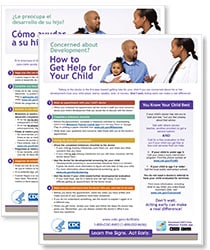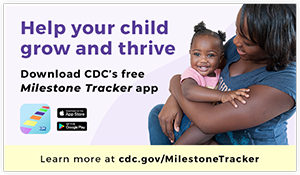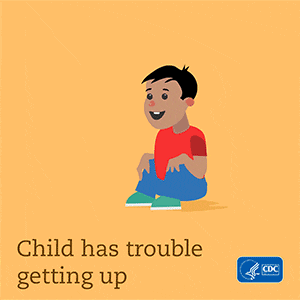Concerned About Your Child’s Development?
Talk to Your Child’s Doctor
As a parent, you know your child best. If your child is not meeting the milestones for his or her age, or if you think there could be a problem with the way your child plays, learns, speaks, acts, and moves talk to your child’s doctor and share your concerns. Don’t wait. Acting early can make a real difference!
Complete a Milestone Checklist for Your Child’s Age
- Use the Milestone Tracker app or fill out a milestone checklist [4 MB, 24 Pages, 508] to track your child’s development. Share the completed checklist or milestone summary with your child’s healthcare provider. Note: these checklists are not a substitute for standardized, validated developmental screening tools.
- Read the tip sheet How to Get Help for Your Child [727 KB, 2 Pages, 508] for steps you can take to help you act on developmental concerns.
- Click here for a video in American Sign Language (ASL) on what to do if you have concerns about your child’s development.
Ask About Developmental Screening
The American Academy of Pediatrics recommends that children be screened for general development using standardized, validated tools at 9, 18, or 30 months and for autism at 18 and 24 months or whenever a parent or provider has a concern. Ask the doctor about your child’s developmental screening.
Easterseals, provides parents with FREE access to the Ages & Stages Questionnaires®, Third Edition, one of many general developmental screening tools. Click here to learn more and take the screening. Be sure to share the completed questionnaire and results with your child’s doctor.
Ask For a Referral

If you or the doctor thinks there might be a delay, ask the doctor for a referral to a specialist who can do a more in-depth evaluation of your child.
Doctors your child might be referred to include:
- Developmental pediatricians. These doctors have special training in child development and children with special needs.
- Child neurologists. These doctors work on the brain, spine, and nerves.
- Child psychologists or psychiatrists. These doctors know about the human mind.
Get an Evaluation
At the same time as you ask the doctor for a referral to a specialist, call your state’s public early childhood system to request a free evaluation to find out if your child qualifies for intervention services. This is sometimes called a Child Find evaluation. You do not need to wait for a doctor’s referral or a medical diagnosis to make this call. Where to call for a free evaluation from the state depends on your child’s age:
Children 0-3 Years Old

If your child is younger than 3 years old, contact your local early intervention system.
Find your state’s early intervention contact information here.
Learn more about early intervention >
Children 3 Years Old or Older
If your child is age 3 or older, call any local public elementary school (even if your child does not go to school there) and say: “I have concerns about my child’s development and I would like to have my child evaluated through the school system for preschool special education services.”
- If the person who answers is unfamiliar with preschool special education, ask to speak with the school or district’s special education director.
More Tips for Parents
Why Act Early?
If you’re concerned about your child’s development, don’t wait. Acting early on developmental concerns can make a real difference for your child and you.
Learn more >
What to Say
If you’re not sure what to say when you talk with your child’s doctor or when you call to request an evaluation, visit our web page for some tips.
While You Wait
If you have to wait to get an appointment to see a specialist or start intervention services, know that there are some simple things you can do today and everyday to help your child’s development.
Recordkeeping Worksheet
Use this recordkeeping worksheet to help you keep track of your notes.


